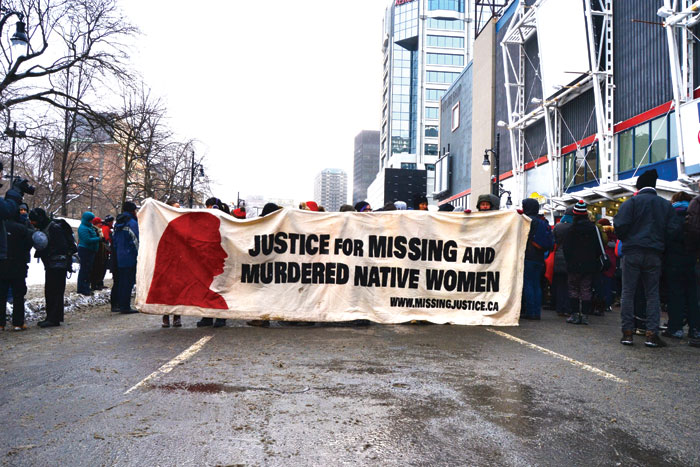Approximately 2,000 people marched to raise awareness for missing and murdered indigenous women in downtown Montreal on Saturday.
The march was organized by Missing Justice, a Montreal grassroots collective focused on indigenous women’s rights. According to Monica van Schiak, who was in charge of the march’s public relations, it was one of the biggest gatherings they’ve ever had.
“Today’s march is for missing and murdered women—all women,” said van Schiak. “It’s important for us to have many different representatives come, and we made sure to make contact with many different communities.”
Similar marches also took place on Saturday in dozens of other Canadian cities. The marches are a part of the Annual Memorial March for Missing and Murdered Women, which was founded in 1991 in B.C. after the murder of a Coast Salish woman in Vancouver.
According to the Human Rights Watch, a non-governmental organization dedicated to protecting the human rights of people around the world, indigenous women and girls represent only 4.3 per cent of the female population, but 16 per cent of female homicide victims. There are over 1,200 women listed as murdered or missing in Canada. According to a report released by Amnesty International Canada in December 2014, the issue of missing and murdered women in Canada is a national human rights crisis.
The marchers walked around two kilometres along Sainte-Catherine Street, from Cabot Square to Phillips Square, stopping to hear various speakers and drum performances. Two native drum groups, Odaya and the Buffalo Hut, performed healing songs to memorialize the missing women.
In Phillips Square, volunteers from Missing Justice had written out the name of every disappeared woman on individual signs. The signs had been left in the snow as a reminder of the tragedy.
The speakers at the march spoke out against the issues of neo-colonialism, racism, and misogyny that they feel are behind the government’s slow reaction to the disappearances.
“I would like us to take a moment to consider the land beneath the concrete we are standing on,” said a representative from Missing Justice, reading out from the organization’s mission statement before the march began. “To consider that any efforts to address violence against missing women is occurring on unseated Kahnawake land, on Mohawk territory. And I would like for us to reflect on the impossibility of separating violence against women from an ongoing legacy of colonial violence.”
To the protesters in Cabot Square, there were many reasons to gather that day. Celia, a student at the Université de Montréal, who did not provide her last name said that she was there as a feminist in support of women’s issues.
“I like to be informed, I read many articles,” Celia said. “I noticed that native women don’t have the same services as we do, and I thought we had to do something about it.”
A representative from Missing Justice spoke to the crowd regarding the broad scope of the issue.
“I don’t know why any of you are here; I don’t know for whom you are here; I don’t know if there is anything essentially common to our experiences, to what we mean by violence, to what we mean by women, or to what we mean by memorial,” they said. “So my hope is that beyond any sense of a common understanding, we can still walk beside each other today. We can support each other in a unity that’s composed of our unique and complicated realities.”
A number of different women’s organizations also attended the march. Representatives from the Canadian Association of Congolese Women (CACW), the South Asian Women’s Community Centre, and the Regroupement de Centre des Femmes à Québec all participated to speak out on an issue they felt affects all women.
One of the guest speakers from the CACW, who provided her name only as Selemona, chanted “Mille femmes qui tombent, deux mille se lèvent,” meaning “A thousand women who fall, two thousand rise up.” Protesters also held picket signs reading “A thousand is more than just a number.”
John Cree, a Cree man, who led the opening and closing prayers for the event, said that his goal working with Missing Justice is to keep the subject of the missing women prioritized.
“I was told a long time ago that if you want to destroy a nation, you take away the women, and the nation dies, because that’s our foundation—that’s our strength,” Cree said. “It seems like we’ve lost a lot of native women and nothing has been done. The government hasn’t moved on it, and the police force hasn’t. I wonder if sometimes they don’t want to know what is happening.”









